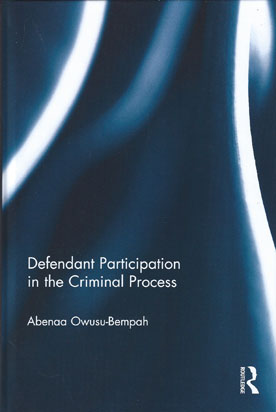
Requirements for the defendant to actively participate in the English criminal process have been increasing in recent years such that the defendant can now be penalised for their non-cooperation. This book explores the ramifications of penalising a defendant’s non-cooperation, particularly its effect on the adversarial system.
The book develops a normative theory of criminal procedure which proposes that the criminal process should operate as a mechanism for calling the state to account for its accusations and request for official condemnation and punishment of the accused. It goes on to examine the limitations placed on the privilege against self-incrimination, adverse inferences drawn from a defendant’s silence, and adverse inferences drawn from defence non-disclosure.
The book shows how by placing participatory requirements on defendants and penalising them for their non-cooperation, a new participatory model of procedure has developed. This model relies on the active participation of the defendant in pursuit of efficient fact-finding, and so, is far removed from England’s history of adversarialism, and shows less of a regard for legitimacy, fairness and respect for defence rights.